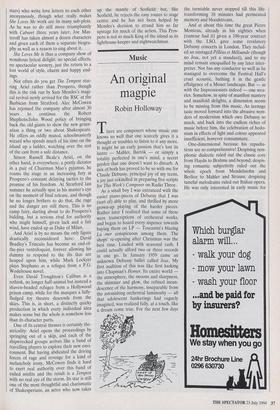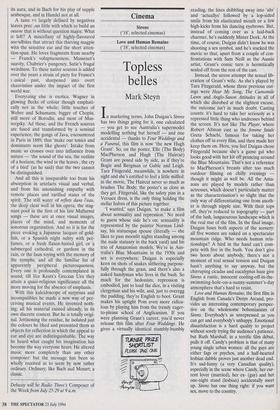Music
An original magpie
Robin Holloway
There are composers whose music one knows so well that one scarcely gives it a thought or troubles to listen to it any more. It might be an early passion that's lost its lustre — Mahler, Bartok — or simply a totality perfected in one's mind, a secret garden that one doesn't want to disturb. A mix of both has proved to be so with me for Claude Debussy, principal joy of my teens, a joy just rekindled in preparing five scripts for This Week's Composer on Radio Three.
As a small boy I was entranced with the easier piano-pieces of Debussy that I was (sort of) able to play, and thrilled by more grown-up playing of the harder pieces. Rather later I realized that some of these were transcriptions of orchestral works, and began to hoard every sixpence towards buying them on LP — Toscanini's blazing La mer conspicuous among them. The shops' re-opening after Christmas was the best time. Loaded with seasonal cash, I could actually afford two or three records in one go. In January 1959 came an unknown Debussy ballet called Jew;. My first audition of this was like first looking into Chapman's Homer. Its entire world — the atmosphere, the swoons and sharpness, the shimmer and glow, the refined incan- descence of the harmony, inseparable from the astonishing orchestral luminosity — all that adolescent hankerings had vaguely imagined, was realized fully, at a touch, like a dream come true. For the next few days
the turntable never stopped till this life- transforming 18 minutes had permeated memory and bloodstream.
And at about this time the great Pierre Monteux, already in his eighties when (rumour had it) given a 100-year contract with the LSO, gave some revelatory Debussy concerts in London. They includ- ed an unstagedlleas et Maisande (though no Jeux, not yet a standard), and to my mind remain unequalled by any later inter- preter. Nor has any conductor so well as he managed to overcome the Festival Hall's cruel acoustic, bathing it in the gentle effulgence of a Monet landscape. But — as with the Impressionists indeed — one wea- ries. Somehow, in spite of manifest mastery and manifold delights, a dimension seems to be missing from this music. As teenage taste moved forward into the abrasive won- ders of modernism which owe Debussy so much, and back into the endless riches of music before him, the celebration of hedo- nism in effects of light and colour appeared insufficient, however consummate.
One-dimensional because his repudia- tions are so comprehensive! Despising sym- phonic dialectic ruled out the classic core from Haydn to Brahms and beyond; despis- ing romantic subjectivity ruled out the whole epoch from Mendelssohn and Berlioz to Mahler and Strauss; despising tuneful melodrama ruled out Italian opera. He was only interested in early music for its aura, and in Bach for his play of supple arabesque, and in Handel not at all.
A taste Fo largely defined by negatives leaves prec Jus little with which to build an oeuvre that is without question major. What is left? A miscellany of highly-flavoured soindbites that attract this thieving magpie witn the sensitive ear and the short atten- tion-span. He loves fragments from nearby — Franck's voluptuousness, Massenet's suavity, Chabrier's pungency, Satie's frugal weirdness. To these native sources is added over the years a strain of piety for France's ,usical past, sharpened into overt chauvinism under the impact of the first world war.
Everytning else is exotica. Wagner in glowing flecks of colour though emphati- cally not in the whole; little touches of Weber and Schumann, bigger of Chopin, still more of Borodin, and most of Mus- sorgsky. Ad. these, and the French sources are fused and transformed by a seminal experience, the gongs of Java, encountered in Paris in 1889, that 'make our tonics and dominants seem like ghosts'. Intake from music so crosses over into influence from nature — 'the sound of the sea, the outline of a horizon, the wind in the leaves , the cry of a bird' (as he said) that the two cannot be distinguished.
And all this is inseparable too from his absorption in artefacts visual and verbal, and from his astonishing empathy with remote places and rarified states of the spirit. The still water of re/lets dans reau, the deep clear well in his opera, the stag- nant pool in the first of his late Mallannel songs — these are at once visual images, places of the mind, and moments of sonorous organisation. And so it is for the piece evoking a Japanese lacquer of gold- fish, or a Spanish night sultry with per- fumes, or a fresh flaxen-haired girl, or a submerged cathedral, or gardens in the rain, or the faun toying with the memory of the nymphs, and all the familiar list of apparently peripheral picturesqueness. Every one is profoundly contemplated in sound, till like Keats's Grecian Urn they attain a quasi-religious significance all the more moving for the absence of emphasis.
With this kaleidoscope of surprises and incompatibles he made a new way of per- ceiving musical events. He invented noth- ing; all his material existed already, in its own discrete context. But he is totally origi- nal. Jettisoning the residue, he isolated just the colours he liked and presented them as objects for reflection in which the appeal to ear and eye are indistinguishable. The way he heard what caught his imagination has become the way everyone hears. He altered music more completely than any other composer: but the message has been so wholly received as to seem by now rather ordinary. Ordinary; like Bach arid Mozart; a classic.



















































 Previous page
Previous page